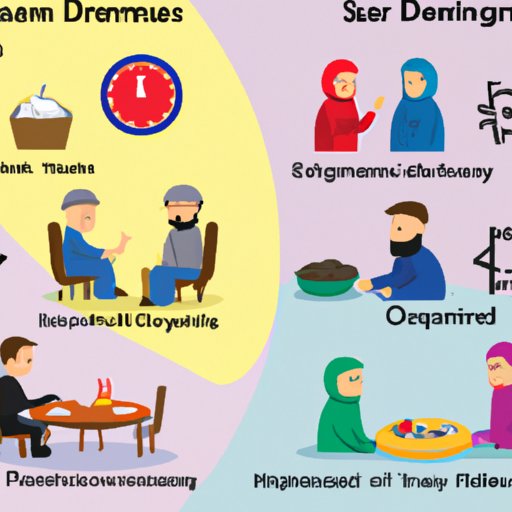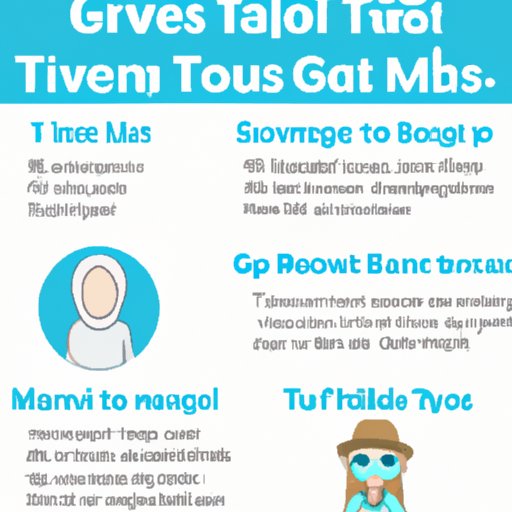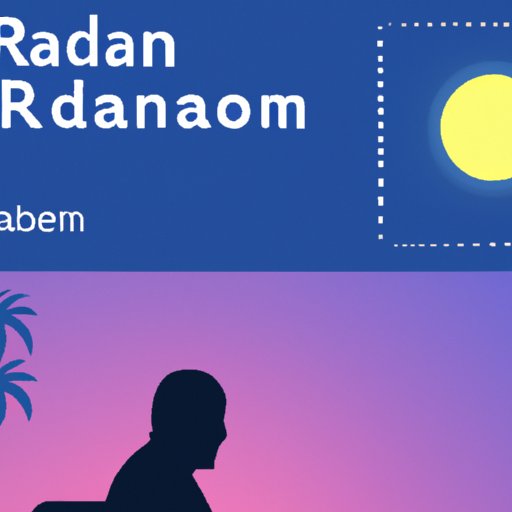Introduction
Ramadan is a holy month in the Islamic religion, celebrated each year by over 1.6 billion Muslims around the world. It marks the ninth month of the Islamic lunar calendar, which is based on the phases of the moon. During this time, Muslims observe a period of fasting from sunrise to sunset, abstaining from food and drink – including water – as well as sexual activity.
The purpose of Ramadan is to increase one’s faith, mindfulness, and connection to God through prayer and charitable acts. As such, many Muslims choose to stay home and focus on these activities rather than travel. But for those who do choose to travel during Ramadan, there are a few important things to consider.
Exploring How Ramadan Changes Travel Destinations and Experiences
One of the most obvious impacts of Ramadan on travel is airfare prices. Prices tend to be higher during Ramadan due to increased demand, so it’s important to plan ahead and book flights early. Additionally, certain destinations may be more popular during Ramadan, particularly places that are known for their religious ceremonies and festivities.
For Muslim travelers, there are also religious considerations to keep in mind. Since the main purpose of Ramadan is to focus on spiritual growth and renewal, it’s important to prioritize prayer, reflection, and charity. This means that it’s a good idea to look for lodging that has separate areas for prayer, and to research local mosques and other places of worship. Additionally, travelers should be mindful of the fact that many stores and restaurants will be closed during daylight hours, so it’s important to plan meals and activities accordingly.
Finally, it’s important to note that the experience of traveling during Ramadan can vary greatly depending on the destination. In some countries, like Saudi Arabia and Qatar, the observance of Ramadan is very strict and there are no public gatherings or events. In other countries, like Egypt, Morocco, and Turkey, there are plenty of public festivals and celebrations, and travelers can join in the festivities without feeling out of place.

Describing Cultural and Social Activities Available During Ramadan
When traveling during Ramadan, it’s possible to experience unique cultural and social activities that are not available any other time of year. For example, many cities and towns host special festivals and events to mark the beginning and end of Ramadan. These often involve music, dancing, and traditional foods. Additionally, many restaurants and cafes offer special menus and discounts during Ramadan, so travelers can sample local delicacies at a discounted price.
In addition to festivals and events, there are also plenty of opportunities to learn about local customs and traditions. Many cities have special exhibits and tours that teach visitors about the history and culture of Ramadan. Additionally, travelers can visit mosques and other religious sites to gain a deeper understanding of the Islamic faith.

Outlining Tips for Muslim Travelers
When planning a trip during Ramadan, it’s important to take a few key steps to ensure an enjoyable and meaningful experience. First, it’s important to prepare for the physical demands of fasting by eating healthy meals and drinking plenty of water before sunrise and after sunset. Additionally, it’s a good idea to bring a prayer rug, a Quran, and other items that will help with prayer and reflection.
It’s also important to remain mindful of the religious and cultural customs of the country you’re visiting. For example, some countries may require women to cover their hair or wear long sleeves and pants. Additionally, travelers should be aware of local laws regarding alcohol and gambling, both of which are prohibited during Ramadan.
Finally, it’s important to take advantage of the spiritual benefits of traveling during Ramadan. This is a great time to connect with locals and learn about different cultures, and to reflect on your own beliefs and values. Additionally, travelers can take part in special prayers and devotions that are only available during Ramadan.
Conclusion
Traveling during Ramadan can be a unique and rewarding experience, but it’s important to be mindful of the religious and cultural considerations involved. By preparing for the physical demands of fasting, remaining respectful of local customs, and taking advantage of the spiritual benefits of Ramadan, travelers can make the most of their experience. Travelers can explore new cultures, connect with locals, and enjoy unique festivals and events – all while deepening their understanding of the Islamic faith.
(Note: Is this article not meeting your expectations? Do you have knowledge or insights to share? Unlock new opportunities and expand your reach by joining our authors team. Click Registration to join us and share your expertise with our readers.)
